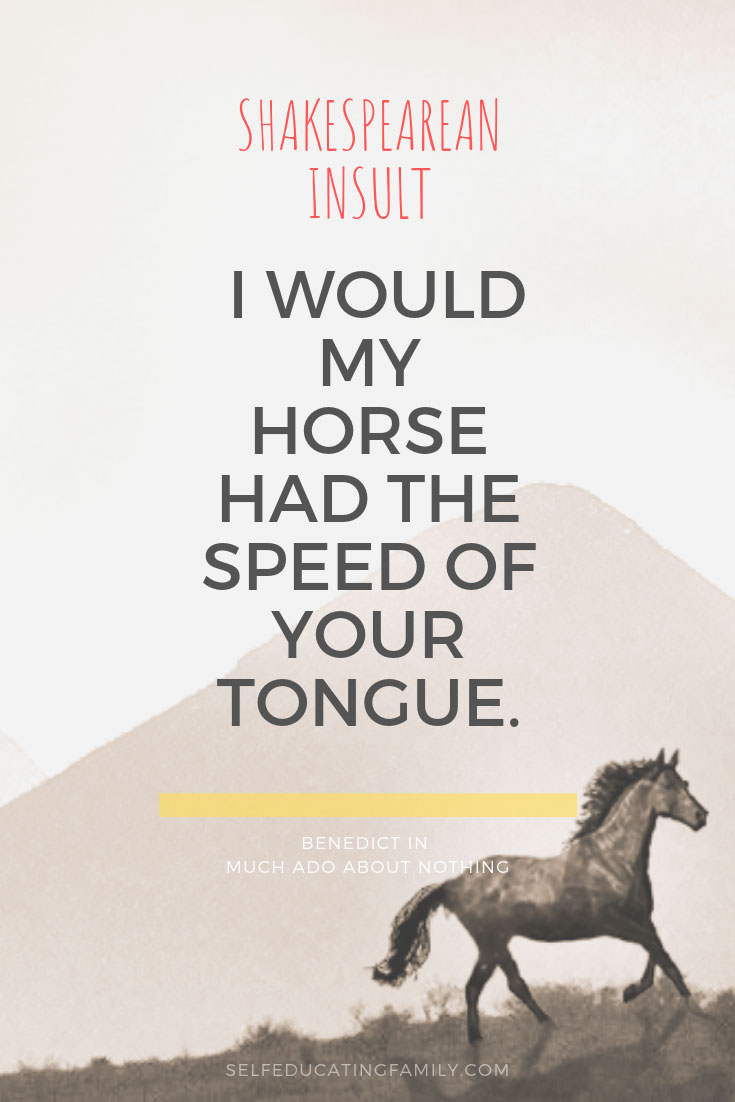Shakespeare has some great insults
Shakespeare has some of the best insults ever. The insults often come across as funny, but sometimes they are outright mean.
In Henry IV Part 1 (Act II, Scene 4), a Sheriff tells Prince Henry that they are looking for a really fat man who is “as fat as butter.”
That’s pretty mean. But Falstaff is hiding behind the curtains* in the corner of the room – so it’s funny. Falstaff is a comic character who appears in three of Shakespeare’s plays, and funny insults are often bandied about when he is near.
*Note: It’s actually an “arras” which is like an alcove with tapestries hanging to cover it. In another play, Polonius is eavesdropping on Hamlet from the arras, when he is accidentally slain.
Take a step back – Why Study Shakespeare?
In some earlier posts, we looked at how to study Shakespeare in a group and why you should study Shakespeare. We also have looked at How to Plan Shakespeare for Your Homeschool Year.
However, all of these articles neglect to mention one of the key reasons to study Shakespeare – to become better at using insults. You might become so good, that no one even knows you’ve just insulted them.
The important thing to remember here is the more familiarity with the Bard you acquire, the better at Shakespearean insults you become.
Familiarity does not breed contempt here …. Or does it?
Master of Plays, master of words, master of insults
Some choice insults:
- “There’s small choice in rotten apples” – Taming of the Shrew
- “I’ll beat thee, but I would infect my hands.” – Timon of Athens, Act IV, Scene 3
- “You scullion! You rampallian! You fustilarian! I’ll tickle your catastrophe!” – Henry IV Part 2,(Act II, Scene 1
I had to look up what a fustilarian was. The good news is – no one would know what that is if you called them that!
There are plenty of places to look up Shakespeare’s best insults. Some are listed at the bottom of this article.
What about learning to make my own insults?
Great question!
Conveniently, there are quite a few Shakespearean insult generators online. Just Jump to the Bottom of this post. But if you really want to learn to make your own, a simple formula involves grammar – like a mix and match Mad Lib.
You need an adjective and a noun. And sometimes a participle.
Samples:
- “Thou lily-liver’d boy” – Macbeth Act V, Scene 3
- “That poisonous bunch-back’d toad!” – Richard III, Act I, Scene 3
- “Thou clay-brained guts, thou knotty-pated fool, thou whoreson obscene greasy tallow-catch!” – Henry IV Part 1, Act II, Scene 4
How to actually use Shakespearean insults casually
- Start small. Add a few “thee”s and “thou”s into everyday language
- For example:
- When asking your co-worker to go to the lunch trucks, say, “Wouldst thou appreciate a foray to the lunch trucks today?”
- If you need your child to take out the garbage, say, “Canst thou perchance remove this trash from my presence?”
- When playing fetch with your dog, yell, “Fetch thy ball!” You can add a “thou cur!” if you like, since you are talking to a dog anyway.
- For example:
- Know your insultee.
- Some people don’t like being called “cur”. Or “lily-faced”.
- You don’t want to start a sword fight.
- Practice while watching sports game on TV. Insult away! The TV doesn’t talk back.
- You can move up to a live audience like your kid’s soccer game if you think you can avoid a sword fight.
- Take fencing lessons.
IMPORTANT! Tips to avoid Sword fights
- Only use insults while driving.
- If you have to insult in person, Be sure your face-to-face insultee doesn’t understand Shakespearean English (like the fustilarian comment).
- Say your insult sweetly, with a smile.
- You can’t just fake the insult because it probably won’t go over well. Be sure to read more Shakespeare or watch more of his plays.
For Further Study
Shakespearean insult generators
List of Top Insults
If you are just looking for the best insults written by Shakespeare himself (more or less), here’s some places to get started.
- 39 famous and funny Shakespeare insults
- More Shakespeare insults from No Sweat Shakespeare
- Funny insults from What’s on Stage
Best Film version of a play for insults
Taming of the Shrew with Richard Burton and Liz Taylor. Remember, the two main actors were married. Twice.
The play is a little bawdy as written, so screen it first if you are watching it as a family film. But it certainly has its share of insults! And Taylor & Burton have a lot of chemistry for an “irksome brawling scold” and a “mad-brain rudesby, full of spleen.”
Finally



I thought you might enjoy some coloring bookmarks of Shakespearean insults.
If you would like bookmarks with great quotes already made for you that you don’t have to color in, check out the Shakespeare bookmarks in my shop.
Enjoy!
